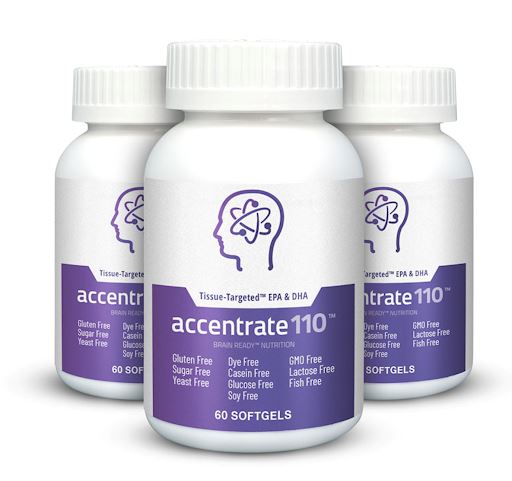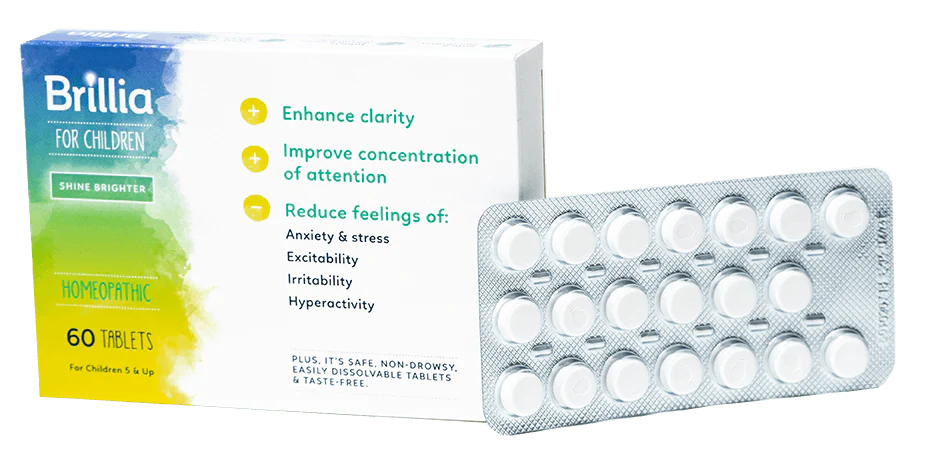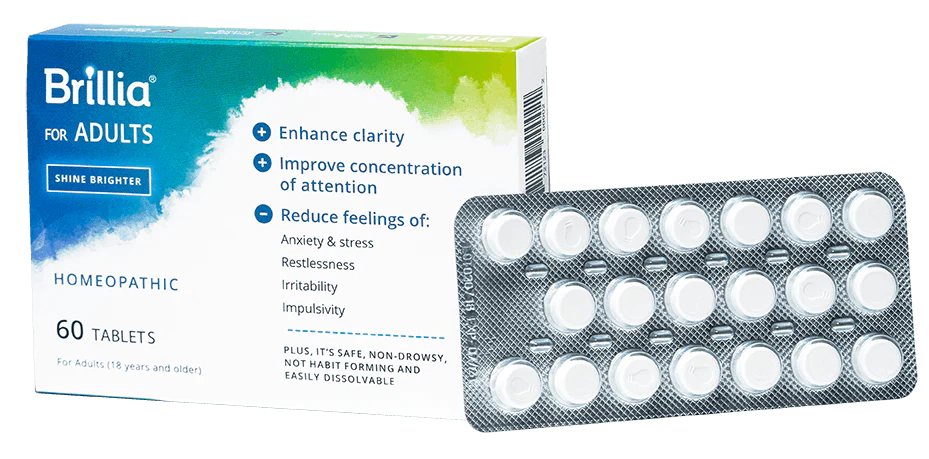Brillia vs Accentrate
Though 62 percent of children in the U.S. take medication to treat ADHD symptoms, many parents look for alternatives to commonly prescribed stimulants to avoid side effects like appetite loss, headaches, and sleep problems.1 One of these alternative options is Accentrate, a nutritional supplement that claims to improve weak attention, memory, and focus through its mixture of lipids, vitamins, and minerals. To find out how Accentrate compares to Brillia, we’ll explore how the ingredients differ, what Accentrate reviewers have to say, and potential side effects that may occur when taking this supplement.
What is Accentrate?
Accentrate is a supplement developed by Fenix Health Science, LLC to address nutritional deficiencies thought to be associated with ADHD. Containing lipids, vitamins, and minerals like L-Methylfolate, Vitamin D3, Magnesium, Vitamin B6, as well as EPA and DHA (sources of omega-3s), Accentrate is intended to support attention, memory and focus. The non-patented nutritional supplement comes as a chewable softgel for children and is also available in a separate formulation for teens and adults over 110 lbs.
The Brillia Story
Unlike Accentrate, Brillia is not just a nutritional supplement. It is a homeopathic non-prescription medication with clinical studies supporting Brillia’s claims that it reduces ADHD symptoms like hyperactivity and impulsivity as well as anxiety and irritability. In place of synthetic chemicals found in the active ingredients of stimulant ADHD medication and the vitamins and minerals found in nutritional supplements like Accentrate, Brillia’s active ingredient consists of antibodies to the brain-specific S100B protein. Studies show that when this protein is out of balance in the body, it contributes to increased susceptibility to stress and anxiety.2 Brillia's antibody ingredient binds to the S100B protein to regulate its activity and prevent ADHD symptoms like excitability and hyperactivity at the source. This is achieved without causing any harmful side effects or impacting any other systems in the body. Another factor that makes Brillia unique is its holistic method. Supporting Brillia’s antibody science is the 5-Pillar program, which encourages healthy lifestyle changes like proper nutrition, adequate sleep, controlled screen time, and mindfulness. By combining antibody science with behavioral science, Brillia allows users to manage ADHD symptoms with a multifaceted approach to ensure long-lasting, effective change.
Shine Brighter
How Brillia Works
The S100B protein is involved in the regulation of a number of cellular processes, including mood. When it binds to its target in the brain, it has the potential to unlock symptoms associated with ADHD like lack of focus, irritability, hyperactivity, and anxiety. Brillia’s targeted antibodies reduce these symptoms by attaching to the S100B protein and modifying it so that it is incapable of binding to this target to unlock these symptoms. This process is incredibly efficient and effective, so that it will not produce harmful side effects, mask the personality, or have undesirable interactions with other medications or supplements. When used in combination with the 5-Pillar Program, users experience enhanced clarity and focus and less irritability so they can feel more stable at home, school, or work. These claims are substantiated by double-blind trials and clinical studies confirming its safety and efficacy.
Brillia Ingredients vs Accentrate Ingredients
Brillia uses antibodies to the S100B protein because of what studies show about the protein’s connection to ADHD, anxiety, stress, irritability, and impulsivity. Studies that support Brillia’s active ingredient include the following:
- A 2010 study indicates that S100B levels are higher in adolescents struggling with suicidal ideation.3 Several of these adolescents were diagnosed with mood disorders that included ADHD and ODD.
- Another 2010 study found that when given low doses of antibodies to the S100 protein, children with ADHD experienced relief from symptoms like inattention and hyperactivity.4
- This 2013 study shows that the S100B protein levels are elevated in people with mood disorders, including depression and mania.5 Other studies confirm that these mood disorders are common psychiatric comorbidities that co-occur with ADHD.6
- Another 2013 study found that elevated S100B protein levels were associated with delirium, with one of the hallmark symptoms being inattention.7
- This 2021 Japanese study shows a correlation between variations in the S100B protein and the severity of ADHD symptoms.8
As far as Brillia’s efficacy, this 2019 study found that Brillia had a “pronounced therapeutic effect in patients with mild to moderate ADHD.”9 The homeopathic medication neutralized all clinical manifestations of disturbances of behavior and attention, including hyperactivity and cognitive deficit while improving school performance in patients.
When it comes to the ingredients used in Accentrate, studies on its efficacy are inconclusive:
- While the omega-3s found in Accentrate have been shown to improve ADHD symptoms in children, this is only the case when the children also have an omega-3 deficiency in addition to ADHD.10
- Another ingredient in Accentrate is L-Methylfolate, though this 2019 study found that methylfolate does not have beneficial effects on ADHD, with no marked difference from placebo.11
While the other vitamins and minerals found in Accentrate are essential for overall good health, the Mayo Clinic explains that there's “no evidence” that supplemental vitamins or minerals can reduce symptoms of ADHD.12 They also warn that “megadoses” of vitamins can actually be harmful.
How Brillia Compares to Accentrate
Potential side effects and adverse reactions that are listed on the Accentrate website and Accentrate labeling include: upset stomach, headache, diarrhea, polycythemia vera (a blood disorder), itching, transitory exanthema (a rash), swelling, allergic reactions, acne, skin reactions, photosensitivity, nausea, vomiting, abdominal pain, loss of appetite, paresthesia (pins and needles), and somnolence (drowsiness).13, 14 The makers of Accentrate also recommend caution to users with a family history of bipolar illness and patients taking anticonvulsant medications. When it comes to parent reviews, some report fewer outbursts and more calmness in their children, while other parents report troubling side effects not mentioned on the Accentrate website.15 These include “severe allergic reaction[s],” “bruising,” and poor taste.
On the other hand, Brillia has no known harmful side effects or contraindications with any other medications, supplements, or health conditions. In lieu of recommending nutritional supplements, Brillia relies on a holistic approach, encouraging users to improve their nutrition naturally along with other healthy lifestyle factors like adequate sleep, mindfulness, and controlled screen time. Together with Brillia, these factors help to reduce symptoms and promote a calmer, more balanced state for long-term health. While the active ingredient in Brillia isolates the S100B protein and regulates its behavior, targeting symptoms at the source, healthy lifestyle changes provide users with tools and resources they can use well into the future.
Brillia is taken as an easy-dissolve tablet made without any added flavors, sugars or colors, ensuring administration is easier and safer than ever. For even more assurance, every box of Brillia is carefully examined and backed up by substantial documentation, following all FDA standards and regulations. The medication is supported by over 10 years of successful use in Europe while Accentrate’s parent company Fenix Health Science was established in 2017.
When devising a plan to manage your ADHD symptoms or those of your child, we know how important it is to prioritize safety and quality. At Brillia, we are committed to full transparency when it comes to our products. Learn more about how Brillia works, review our Verified Science page for more information on the ingredients contained within the medication, and feel free to explore testimonials for more peace of mind.
Get a whole bunch of support right in your inbox.







